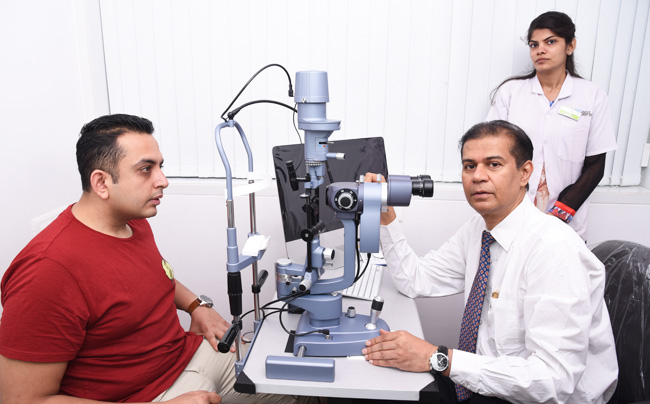
August 13, 2019 | Author: Admin
Various questions come in mind of the person undergoing cataract surgery. These questions may be regarding the need of glasses after surgery, the safety of cataract surgery, the procedure of cataract surgery, recovery process and how to search for the best cataract surgeon.
Whatever the type of lens used during cataract surgery, the dependency on glass for performing routine activities gets significantly reduced. Various factors are involved in determining the need for prescription glasses after cataract surgery. These factors include the overall health status of the eye, need of the patient, presence of astigmatism and the present prescription of glasses.
Use of the type of lens also determines whether the patient has to need glasses after cataract surgery. Monofocal lens is one of the most common lenses used during cataract surgery. Monofocal lens is used to correct the vision at a single focal point. Thus, the patient with a monofocal lens focused for distant vision should need glasses for doing close activities such as reading.
Astigmatism corrected lenses correct astigmatism and reduce the dependency on glasses. However, the glasses are still used for certain activities.
The multifocal lens implanted during cataract surgery also reduces the need for prescription glasses as they are focused both for near and distant vision.
Cataract surgery is a common surgical procedure with a high rate of success. With the advancement of technology and modern instruments along with the experienced surgeons, this surgery is safe with minimum or almost no complications.
As with other surgeries, some risks are associated with this surgery. The risks are rare and depend upon the ocular health of the patient. The risk includes infection, retinal detachment, glaucoma, worsening of other ocular disorders, retention of cataract piece in the cavity and failure to improve vision after surgery due to another underlying disease.
Risk of infection is controlled by administration of eye drops after surgery strictly as directed by the surgeon. With highly-sophisticated instruments and modern technology, retention of cataract in the cavity is very rare, and to identify any underlying disease, the comprehensive ocular examination should be done before surgery.
Cataract surgery is required when the lens of the eye gets blurred. The lens is made of protein and with age, the protein in the lens gets degenerated leading to the cloudy lens. The condition may be present in both the eyes with varying severity.
During the cataract process, the natural lens is replaced with an artificial lens. The procedure is done as an outpatient under local anesthesia. An incision is done on the cornea through which an ultrasound device is inserted. This ultrasound device destroys the cloudy lens.
Lens fragments are taken out and it is also ensured that not fragments get retained. The new, artificial intraocular lens is then implanted. The whole procedure takes around 30 minutes.
To avoid any complication and to successfully restore the vision, proper post-operative care of the eyes should be done. After the surgery is done, some patients, for about an hour, have blurred and wavy vision. Don’t panic in this situation. Eyes will take some time to adapt to the new lens and improved vision. As the incision is done on the eye, there may be redness and bloodshot on the white of the eye. This will heal with time.
The doctor will prescribe you certain medications including antibiotics, NSAIDs and steroidal drugs. Antibiotics will help in reducing the risk of infection. These are also administered before surgery. NSAIDs and steroidal drugs are used to relieve redness, pain, and inflammation.
Cataract surgery is highly successful in restoring the vision of the patient. However, the extent of improvement varies from patient to patient. If the patient does not have any other underlying disease, the vision restoration is near to perfection. Patient with macular degeneration and glaucoma may have improved but limited vision.
The patient may able to see colors brighter which were looking dull due to the cloudiness of the lens. The bright light is no more able to create a problem and the patient may be able to drive safely at night. The glare causing due to bright light, especially at night disappears after surgery.
People who wish to undergo cataract surgery search for the best cataract surgeon mumbai. As the surgery involves eyes, which is a vital organ, they do want to take any risk. The patient should look for an experienced surgeon with high and exceptional success rates.
The patient should also look for online reviews related to a particular surgeon. Advanced degree and abroad training are some other parameters that may help in choosing a cataract surgeon. Do not settle for anything below best and do a comprehensive search for a surgeon who does the best cataract surgery in India. Always ask for the total cost of surgery as some clinics may have hidden fees and ambiguous offers.